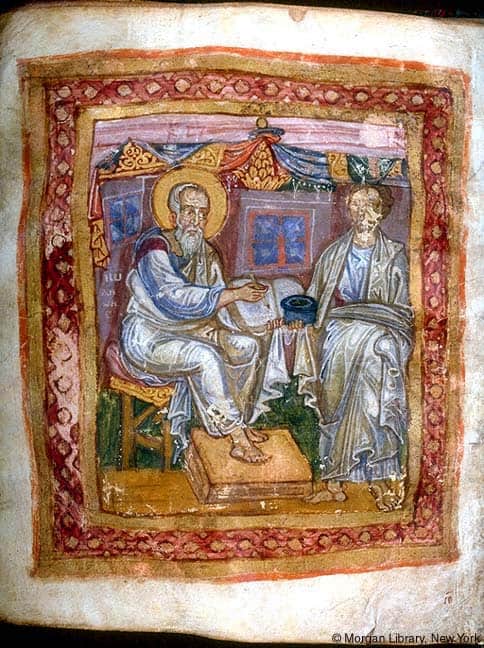The Law and Me (Matthew 5:17-20)

Big Idea: Don’t toss the law out. Take the law in.
I want to introduce you to someone you’ve never met before — or maybe you have.

His name is Marcion. He lived very early in the life of the church, from around 85 to 160. The reason that we remember Marcion today is because of what he believed. He believed and taught that the Hebrew Scriptures — the Old Testament — are incompatible with Christianity. He believed that the God of the Old Testament was a tribal deity of the Jews, and that he was legalistic and judgmental. On the other hand, he believed that the God of the New Testament is different altogether. He is a God of compassion and grace. And so he rejected the Hebrew Scriptures and tried to rid Christianity of all traces of Judaism. He ended up creating his own Bible with fewer and shorter books.
I said that you haven’t met Marcion, but there’s actually a good chance you’ve met someone like him. Although Marcion is long gone, I hear variations of his views all the time. Just recently a famous pastor suggested that we need to unhitch our faith from the Old Testament. He said:
[First century] Church leaders unhitched the church from the worldview, value system, and regulations of the Jewish scriptures…Peter, James, Paul elected to unhitch the Christian faith from their Jewish scriptures, and my friends, we must as well.
I get it. The Hebrew Scriptures present us with a lot of challenges: perplexing laws and very troubling stories. It’s easy for us to scratch our heads as we try to figure out how to make sense of it. I’ve heard people say that they just like to focus on Jesus, or even to suggest that God has evolved.
So what should we do? Is it okay to focus on this part of the Bible, the New Testament, and ignore the rest?
Don’t Toss the Law Out
The answer, according to Jesus, is a big fat no. You know those parts of the law that drive you crazy? You know the parts of the Hebrew Scriptures that you just don’t like? You know what I’m talking about — the laws that don’t pass muster, and the troubling incidents that leave us angry and puzzled.
According to Jesus, all of that matters. Listen to what Jesus says:
Do not think that I have come to abolish the Law or the Prophets; I have not come to abolish them but to fulfill them. For truly, I say to you, until heaven and earth pass away, not an iota, not a dot, will pass from the Law until all is accomplished. (Matthew 5:17-18)
Jesus endorses all of it. The term “Law or the Prophets” refers to the entirety of the Hebrew Scriptures. The iota refers to the smallest letter in the Hebrew alphabet; the dot refers to the small stroke they would add to the letter. Jesus was saying that even the smallest part of the Law will continue throughout this life. Jesus endorses all of it.
I’ve heard people put down the Old Testament, and criticize the God of the Old Testament. I’ve heard people argue that the God of the New Testament is different from the God of the New Testament. God in the Old Testament is harsh and angry; God in the New Testament is loving and gracious. I’ve heard people say that they just throw all of it out and just focus on Jesus. Jesus says that all of these approaches miss the point. One rabbi says, “In all rabbinic literature I know of no more unequivocal, fiery acknowledgement of Israel’s holy scripture than this opening to the Instruction on the Mount” (Rabbi Pinchas Lapide). The whole Bible matters.
Why does it matter? Because there’s a permanence to its teaching. Jesus says that all of it will last until the Law is accomplished. That’s interesting: we think that some of it has already passed and become irrelevant. Jesus says this isn’t the case.
I heard a preacher speak last week. At the beginning of each sermon he would read the Scripture before he started to preach. Every time he read the Scripture, he would finish by quoting 1 Peter 1:24-25:
All flesh is like grass and all its glory like the flower of grass. The grass withers, and the flower falls, but the word of the Lord remains forever.
It’s really what we should think every time we read Scripture. One day you will die. One day this building will crumble. One day the most powerful person in the world will be powerless. On that day when we are long dead, and every building around us lies in ruins, the word of the Lord will remain. Jesus says that Scripture matters.
Why does Jesus say this? He says it because he is the fulfillment of that Scripture. Here’s what I think Jesus means. There’s a continuity between the Hebrew Scriptures and Jesus. Jesus doesn’t offer a plan B or a new revelation. Jesus is bringing to completion everything that we find in the Bible. All the themes, all the stories, all the laws point to and find their perfection in him. All of Scripture finds its completion and fulfillment in him.
I’m not saying that we can just apply every part of the Hebrew law to today. We need to wrestle with it, interpret it, and understand it. Some of it applies today — the Ten Commandments, for instance. Some of it is an application of the Ten Commandments to life in that particular society, that would apply in different ways today. The law, for instance, to put a fence around one’s roof still applies today, but the form it takes is different and every bit as relevant. Some of the law — the sacrificial system, for instance — is fulfilled in Christ.
We need to interpret the law, but we can’t afford to chuck any of it. Paul writes in 1 Timothy 1:9, “Now we know that the law is good, if one uses it lawfully…” The law shows us what God is like. It gives us a picture of his holy perfection, and then it shows us how far short we fall of this perfection. It restrains us from doing evil. And shows us how to live lives that are pleasing to God.
Let’s take a moment and apply this in a couple of ways.
First, don’t ever give into the temptation to diminish any part of Scripture. Wrestle with it. Ask questions about it. Struggle to understand it. Admit that it can be difficult, yes. But never dismiss it. Don’t ever try to unhitch any part of Scripture from the rest of it. Treasure all of it. All of this is God’s gift to us. An obvious implication of this is to become a Bible reader. Read all of it from Genesis to Revelation, from front to back. Read the easy parts and the hard parts. All of it is important. You can’t really understand the New Testament unless you understand the Old. If there’s ever a discrepancy between what you believe and what the Bible says, assume that the problem isn’t with the Bible. Assume the problem is with you.
Second: read your Bible in such a way that you have one eye on the text and the other on Jesus. Read the Hebrew Scriptures like a Jewish rabbi would, but don’t stop there. Get to Jesus. I love that Charles Spurgeon said:
You remember the story of the old minister who heard a sermon by a young man, and when he was asked by the preacher what he thought of it he was rather slow to answer, but at last he said, “If I must tell you, I did not like it at all; there was no Christ in your sermon.” “No,” answered the young man, “because I did not see that Christ was in the text.” “Oh!” said the old minister, “but do you not know that from every little town and village and tiny hamlet in England there is a road leading to London? Whenever I get hold of a text, I say to myself, ‘There is a road from here to Jesus Christ, and I mean to keep on His track till I get to Him.’” “Well,” said the young man, “but suppose you are preaching from a text that says nothing about Christ?” “Then I will go over hedge and ditch but what I will get at Him.” So must we do, brethren; we must have Christ in all our discourses, whatever else is in or not in them.
Look for Jesus no matter where you are in the Bible. Read it as a story that culminates in Jesus. I’m not saying this is easy. It will take work. Tools like the Gospel Transformation Bible will help. Remember: the point of all of the Bible is Jesus.
Final implication before we carry on: allow all of the Bible to shape your life. Some people say, “I’m personally against such and such, but it’s not illegal.” For instance, we’re facing a lot of new issues related to sexuality, drug use, and the taking of human life. Some things are now legal that never used to be. We face unrelenting pressure to adopt the world’s views, or at least to keep the biblical view private — like you can hold a private belief inwardly that has nothing to do with how you live your life. Don’t do it. We don’t have that luxury. Culture will tell you to adopt their views, or at least to keep your views to yourself. Jesus says that the teachings of the Word are to shape all of your life. We’re to love the Lord with all of our heart, mind, soul, and strength (Mark 12:30). Scot McKnight comments:
…surely that last term is an embracive term describing all of our resources and externalities. That is, “and strength” would include our political behaviors and actions. If we think the teachings of the gospel are against abortion, we are bound by conscience to support bans on abortion because of what the gospel requires, even if the law permits such. The same applies to so many things, not excluding civil unions, Christian participation in business, the relations of Christians to wartime activities, and divorce, which is one of the topics toward which Jesus turned his gaze in the next passage.
There’s a problem when all of our views line up with the world’s views, and yet this is what is happening all around us. Don’t let it happen to you. Resolve to be someone who is shaped more by Scripture than you are by what everyone tells you. Be a Scriptural contrarian. Commit to thinking and acting in line with what Scripture says. Believe that God knows better than the world about what is right and wrong in this world.
Don’t toss the law out. That’s what Jesus says. All of the Bible matters. Allow yourself to be shaped by it. We’re going to look at the coming weeks about how to apply this to particular moral and ethical issues in our lives.
But before we wrap up, there’s one more thing that Jesus says in this passage.
Take the Law In
Don’t toss the law out, Jesus says. Instead, take the law in.
Therefore whoever relaxes one of the least of these commandments and teaches others to do the same will be called least in the kingdom of heaven, but whoever does them and teaches them will be called great in the kingdom of heaven. For I tell you, unless your righteousness exceeds that of the scribes and Pharisees, you will never enter the kingdom of heaven. (Matthew 5:19-20)
I want you to feel the weight of this statement.
First, Jesus reiterates what we’ve just said: don’t toss the law out. He goes even farther and says that our standing in the kingdom depends on both keeping and teaching others these laws. Friends, we are saved by grace through faith, but make no mistake: each of us will give an account before God (Romans 14:12) and receive judgment based on what we’ve done (2 Corinthians 5:10). Jesus warns us against so presuming on God’s grace that we don’t realize that obeying him matters.
But then Jesus goes even farther. He says that our righteousness must exceed that of the scribes and Pharisees. That’s a little like saying that you have to run faster than Usain Bolt. In Jesus’ day, the scribes and Pharisees were religious untouchables. They were far and away superior to anyone else when it came to righteousness. The scribes and Pharisees made obedience the master passion of their lives. They figured that the Law contained 248 commandments and 365 prohibitions, and they tried to keep them all. As one children’s Bible puts it, they were the “extra-super-holy people.” How can anyone do better than that?
Of course, it’s impossible — unless we receive a grace from above. Left to ourselves, we will never be able to meet the entry standards of the kingdom of heaven. But we trust the only person who ever did keep the law of God perfectly, the one whose righteousness did exceed that of the scribes and Pharisees. We trust in the one who fulfilled its demands by dying in our place. And he is changing us so that we can truly obey — not just externally, but from the very depths of our being, so that it’s not just obeying rules, but joyfully submitting in every way out of love for God.
Friends, keep an eye out for this guy. He’s deadly. Don’t toss the law out. Study it. Interpret it. Obey it. Ask God to change you so that you delight in the law. Ask him to take away your sins if you haven’t done so already. And pursue him with all that you’ve got so that you can obey the law, not just externally but from the heart.





